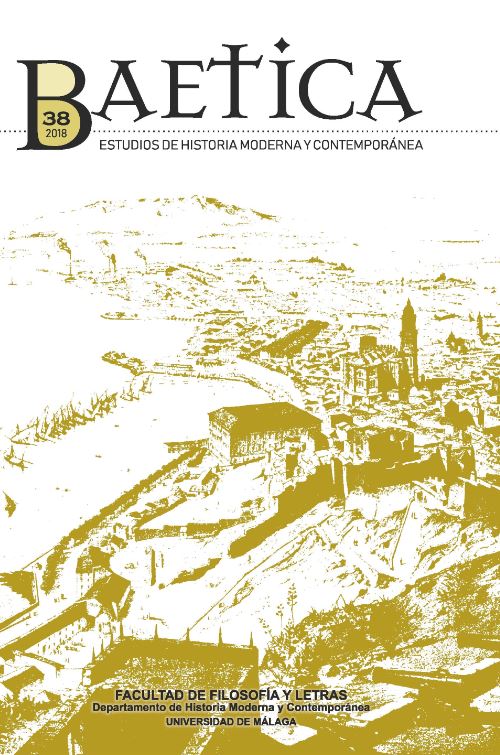Marian Advocation and Religious Ceremonial in the Documentation of the Archive of the Cathedral of Malaga: an approach to Festivities, Masses and Endowments
DOI:
https://doi.org/10.24310/BAETICA.2018.v0i38.5493Keywords:
Virgin Mary, Religious Ceremonial, Archive of the Cathedral of Malaga, Marian Advocation, Liturgy, Testamentary DispositionsAbstract
The present paper aims to make an approach to the Marian presence in the religious ceremony in the Cathedral of Malaga during the 16th-19th. The methodology to be followed to carry out our research has been the analysis of documentary sources of the Cathedral Archive of Malaga city, what has allowed a substancial social, religious and economic character and even identity information. Social outcomes where the Marian presence prevailed were the masses and festivities. Endowment offered by parishioners were collected in books of censuses, anniversaries and memories, and developed in the context of ideal to express their devotion.
Downloads
Metrics
References
CAMINO ROMERO, Andrés (2005), “La devoción a la Inmaculada Concepción en Málaga a través de varias asociaciones religiosas”, F.J. CAMPOS Y FERNÁNDEZ DE SEVILLA (Coord.), La Inmaculada Concepción en España: religiosidad, historia y arte: actas del simposium, 1, Ediciones Escurialenses, Real Centro Universitario Escorial-María Cristina, El Escorial, pp. 645-668.
COLLADO RUIZ, María José (2012), “Las peticiones de ciclos de misas en los testamentos granadinos en los siglos XVI-XVII”, Revista de Humanidades y Ciencias Sociales, 2, pp. 303-318.
FERNÁNDEZ BASURTE, Federico (1994), “El concejo y las fiestas de la Inmaculada en Málaga. 1640”, Espacio, Tiempo y Forma, Serie IV, Hª Moderna, 7, pp. 195-210.
GÓMEZ NAVARRO, Soledad (2008), “Un momento ideal para acordarse de los Santos: Cuando la muerte llega. La cláusula testamentaria de la intercesión en la España Moderna”, en F. J. CAMPOS FERNÁNDEZ DE SEVILLA, El culto a los Santos. Cofradías, devoción, fiestas y arte, Ediciones Escurialenses, Real Centro Universitario Escorial-María Cristina, El Escorial, pp. 57-74.
GONZÁLEZ SÁNCHEZ, Vidal (1994), Málaga. Perfiles para su historia en documentos del Archivo Catedral (1487-1516), Málaga.
LE GOFF, Jacques (1985), El nacimiento del Purgatorio, Taurus, Madrid.
MARTÍNEZ GIL, Fernando (1991), Muerte y sociedad en la España de los Austrias, Tomo II, Universidad Complutense, Madrid.
MARTÍNEZ SOLAESA, Adalberto (1996), Catedral de Málaga: órganos y música en su entorno, Universidad, Málaga.
MARTÍNEZ SOLAESA, Adalberto y NARANJO LORENZO, Luis (2004), Música y cultura: perspectiva histórica, Aljibe, Málaga.
MORALES GARCÍA-GOYENA, Luis (1907), Estatutos de la Catedral de Málaga, Universidad, Granada.
OSTOS SALCEDO, Pilar (2011), “Documentos para el ‘ánima salvar y los herederos apaciguar’ en la Sevilla medieval. Testamentos y dotaciones de capellanías”, Archiv für DiplomatikSchriftgeschichte, Siegel- und Wappenkunde, 57, pp. 275-314.
PINO ROMERO, Antonio Tomás (2012), “Música en honor de los Santos Patronos de Málaga Ciriaco y Paula”, Boletín de Arte, 32-33, pp. 177-206.
REDER GADOW, Marion (1986), Morir en Málaga. Testamentos malagueños del siglo XVIII, Universidad, Málaga.
RIGHETTI, Mario (1955), Historia de la liturgia I, La editorial católica, Madrid.
RODRÍGUEZ BECERRA, Salvador (2000), “Religión y fiestas en Andalucía. Reflexiones metodológicas”, en D. GONZÁLEZ CRUZ (Coord.), Religiosidad y costumbres populares en Iberoamérica: [actas del Primer Encuentro Internacional celebrado en Almonte-El Rocio (España) del 19 al 21 de febrero de 1999, Universidad, Huelva, pp. 153-168.
RODRÍGUEZ DE TEMBLEQUE GARCÍA, Susana Elena (2005), “Actos en honor de Nuestra Señora de la Concepción”, La Saeta, 35, pp. 101-107.
SCHREINER, Klaus (1996), María. Virgen, Madre, Reina, Herder, Barcelona.
TORRE MOLINA, María José de la (2010), “La Catedral de Málaga como modelo de estudio de la música en el ámbito catedralicio español e hispanoamericano: logros, perspectivas y retos”, en A. GARCÍA ABÁSOLO (Coord.), La música de las catedrales andaluzas y su proyección en América, Universidad, Córdoba, pp. 299-341.
Downloads
Published
How to Cite
Issue
Section
License
This journal provides immediate free access to its content on the principle of making research freely available to the public. All content published in Baetica. Modern and Contemporary History Studies are subject to the Creative Commons Acknowledgment-NoCommercial-ShareAlike 4.0 license, the full text of which can be found at <http://creativecommons.org/licenses/by-nc-sa/4.0>
They may be copied, used, disseminated, transmitted and publicly displayed, provided that:
The authorship and the original source of its publication (magazine, publisher and URL of the work) must be cited.
They are not used for commercial purposes.
The existence and specifications of this use license are mentioned.
Copyrights are of two kinds: moral and patrimonial. Moral rights are perpetual, inalienable, non-transferable, inalienable, unattachable and imprescriptible prerogatives. In accordance with copyright legislation, BAETICA. Estudios de Historia Moderna y Contemporánea recognizes and respects the moral right of the authors, as well as the ownership of the patrimonial right, which will be transferred to the University of Malaga for its open access dissemination. Economic rights refer to the benefits obtained from the use or disclosure of works. BAETICS. Estudios de Historia Moderna y Contemporánea is published in open access and is exclusively authorized to carry out or authorize by any means the use, distribution, disclosure, reproduction, adaptation, translation or transformation of the work.
It is the responsibility of the authors to obtain the necessary permissions of the images that are subject to copyright.
Authors whose contributions are accepted for publication in this journal will retain the non-exclusive right to use their contributions for academic, research, and educational purposes, including self-archiving or deposit in open access repositories of any kind.
The electronic edition of this magazine is edited by the Editorial of the University of Malaga (UmaEditorial), being necessary to cite the source in any partial or total reproduction.







2.png)
